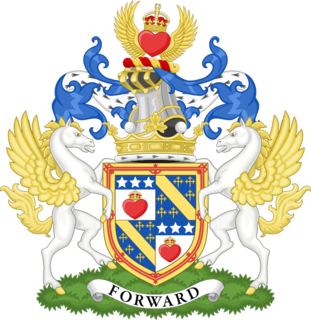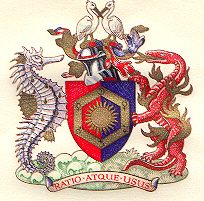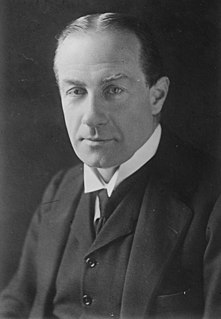
Lord Alfred Bruce Douglas was an English poet and journalist, and a lover of Oscar Wilde. At Oxford he edited an undergraduate journal, The Spirit Lamp that carried a homoerotic subtext, and met Wilde, starting a close but stormy relationship. Douglas's father, the Marquess of Queensberry, abhorred it and set out to humiliate Wilde, publicly accusing him of homosexuality. Wilde sued him for criminal libel, but some intimate notes were found and Wilde was later imprisoned. On his release, he briefly lived with Douglas in Naples, but they had separated by the time Wilde died in 1900. Douglas married a poet, Olive Custance, in 1902 and had a son, Raymond. On converting to Roman Catholicism in 1911, he repudiated homosexuality and in a High-Catholic magazine, Plain English, expressed openly anti-Semitic views, but rejected the policies of Nazi Germany. He was jailed for libelling Winston Churchill over claims of World War I misconduct. Douglas wrote several books of verse, some in a homoerotic Uranian genre. The phrase "The love that dare not speak its name" appears in one,, though widely misattributed to Wilde.

James II was King of Scots from 1437 until his death in 1460. The eldest surviving son of James I of Scotland, he succeeded to the Scottish throne at the age of six, following the assassination of his father. The first Scottish monarch not to be crowned at Scone, James II's coronation took place at Holyrood Abbey in March 1437. James II was known as Fiery Face, a reference to the vermilion birthmark covering the left side of his face, which was deemed by contemporaries as an outward sign of a fiery temper.

Marquess of Queensberry is a title in the Peerage of Scotland. The title has been held since its creation in 1682 by a member of the Douglas family. The Marquesses also held the title of Duke of Queensberry from 1684 to 1810, when it was inherited by the Duke of Buccleuch.

Duke of Hamilton is a title in the Peerage of Scotland, created in April 1643. It is the senior dukedom in that Peerage, and as such its holder is the Premier Peer of Scotland, as well as being head of both the House of Hamilton and the House of Douglas. The title, the town of Hamilton in Lanarkshire, and many places around the world are named after members of the Hamilton family. The ducal family's surname, originally "Hamilton", is now "Douglas-Hamilton". Since 1711, the Dukedom has been held together with the Dukedom of Brandon in the Peerage of Great Britain, and the Dukes since that time have been styled Duke of Hamilton and Brandon, along with several other subsidiary titles.

The Royal Society of Edinburgh is Scotland's national academy of science and letters. It is a registered charity that operates on a wholly independent and nonpartisan basis and provides public benefit throughout Scotland. It was established in 1783. As of 2021, there are around 1,600 Fellows.

The Royal Institute of Chemistry was a British scientific organisation. Founded in 1877 as the Institute of Chemistry of Great Britain, its role was to focus on qualifications and the professional status of chemists, and its aim was to ensure that consulting and analytical chemists were properly trained and qualified. It awarded qualifications: AIC indicating full training, and FIC (fellow) indicating professional competence.

The Trials of Oscar Wilde, also known as The Man with the Green Carnation and The Green Carnation, is a 1960 British drama film based on the libel and subsequent criminal cases involving Oscar Wilde and the Marquess of Queensberry. It was written by Allen and Ken Hughes, directed by Hughes, and co-produced by Irving Allen, Albert R. Broccoli and Harold Huth. The screenplay was by Ken Hughes and Montgomery Hyde, based on the play The Stringed Lute by John Furnell. The film was made by Warwick Films and released by Eros Films.
This is a list of people who served as Lord Lieutenant of Orkney and Shetland. The Lieutenancy was replaced by two Lieutenancies, the Lord Lieutenant of Orkney and the Lord Lieutenant of Shetland, in 1948.

Clan Douglas is an ancient clan or noble house from the Scottish Lowlands.

The Medical Society of London is one of the oldest surviving medical societies in the United Kingdom.
This is a list of members of the Tasmanian Legislative Council between 1885 and 1891. Terms of the Legislative Council did not coincide with Legislative Assembly elections, and members served six-year terms, with a number of members facing election each year.

The 1929 Dissolution Honours List was issued on 28 June 1929 at the advice of the outgoing Prime Minister, Stanley Baldwin.
Sir Alfred Joseph Karney Young was a British barrister and judge. He held a number of political and judicial offices, including Attorney General of British East Africa, Chief Justice of the Seychelles, Attorney General of Fiji, Chief Justice of the Leeward Islands, Chief Justice of Fiji, and Chief Judicial Commissioner for the Western Pacific.
The New Year Honours 1912 were appointments by King George V to various orders and honours to reward and highlight good works by members of the British Empire. They were announced on 29 December 1911.
The New Year Honours 1925 were appointments by King George V to various orders and honours to reward and highlight good works by members of the British Empire. They were published on 30 December 1924.
Edinburgh Collegiate School was located at 27/28 Charlotte Square, Edinburgh. The school was established in 1868.